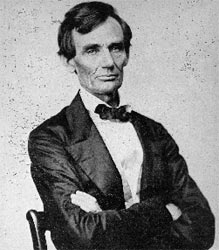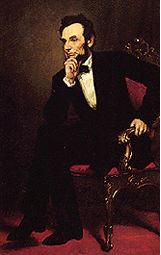Abraham Lincoln and the Civil War
When the anti-slavery Republican, Abraham Lincoln, was elected as America’s 16th President in November 1860, the Southern states decided they had to take drastic action in order to protect their own interests. From Abraham Lincoln’s first day in the White House, he faced the irreconcilable conflict between slavery and abolition. In December 1860, a secession convention comprising seven southern states met in South Carolina and split from the Union. Four other states quickly followed suit. These states established a constitution for the newly formed Confederate States of America with Jefferson Davis chosen as the President.
These events were to set the stage for the bloodiest and saddest war in American history, where at least 600,000 Americans would lose their lives fighting in America, for America, against Americans.
Lincoln warned the South in his Inaugural Address: “In your hands, my dissatisfied fellow countrymen, and not in mine, is the momentous issue of civil war. The government will not assail you…. You have no oath registered in Heaven to destroy the government, while I shall have the most solemn one to preserve, protect and defend it.”
Lincoln also stated “A house divided against itself cannot stand. I believe this Government cannot endure permanently half slave and half free. I do not expect the Union to be dissolved,–I do not expect the house to fall,–but I do expect it will cease to be divided. It will become all one thing or all the other.”
Lincoln thought secession illegal, and was willing to use force to defend Federal law and the Union. When Confederate batteries fired on Fort Sumter and forced its surrender, he called on the states for 75,000 volunteers. The Civil War had begun.
Over the following four years Davis’ Confederate armies fought long hard battles against Lincoln’s Union armies. Battles were won and lost on both sides. Lincoln changed his Commander in Chief of the armies several times, and even took charge himself for a few months, in the search for successful fighting strategies.
On January 1, 1863, Lincoln issued the Emancipation Proclamation that declared forever free those slaves within the Confederacy, but still the war raged on. The tide of war turned against the South on July 3, 1863 as the Confederates were defeated at the Battle of Gettysburg in Pennsylvania.
Lincoln won re-election in 1864, as Union military triumphs heralded an end to the war. In his planning for peace, the President was flexible and generous, encouraging Southerners to lay down their arms and join speedily in reunion.
On 2/4/1865 Gen Grant’s Union forces began a general advance and broke through Gen. Lee’s Confederate lines at Petersburg. Lee evacuated Petersburg. The Confederate Capital, Richmond, was evacuated. The Union troops entered and raised the Stars and Stripes. President Lincoln toured Richmond on 4/4/1865. He entered the Confederate White House and sat at the desk of Jefferson Davis for a few moments.
On 9/4/1865 Gen. Lee surrendered his Confederate Army to Gen. Grant in Virginia.
The son of a Kentucky frontiersman, Lincoln had to struggle for a living and for learning. Five months before receiving his party’s nomination for President, he sketched his life: “I was born Feb. 12, 1809, in Hardin County, Kentucky. My parents were both born in Virginia, of undistinguished families–second families, perhaps I should say. My mother, who died in my tenth year, was of a family of the name of Hanks…. My father … removed from Kentucky to…. Indiana, in my eighth year…. It was a wild region, with many bears and other wild animals still in the woods. There I grew up…. Of course when I came of age I did not know much. Still somehow, I could read, write, and cipher … but that was all.”
Lincoln made extraordinary efforts to attain knowledge while working on a farm, splitting rails for fences, and keeping store at New Salem, Illinois. He was a captain in the Black Hawk War, spent eight years in the Illinois legislature, and rode the circuit of courts for many years. His law partner said of him, “His ambition was a little engine that knew no rest.”
He married Mary Todd, and they had four boys, only one of whom lived to maturity. In 1858 Lincoln ran against Stephen A. Douglas for Senator. He lost the election, but in debating with Douglas he gained a national reputation that won him the Republican nomination for President in 1860.
Lincoln never let the world forget that the Civil War involved an even larger issue. This he stated most movingly in dedicating the military cemetery at Gettysburg: “that we here highly resolve that these dead shall not have died in vain–that this nation, under God, shall have a new birth of freedom–and that government of the people, by the people, for the people, shall not perish from the earth.”
The spirit that guided him was clearly that of his Second Inaugural Address, now inscribed on one wall of the Lincoln Memorial in Washington, D. C.: “With malice toward none; with charity for all; with firmness in the right, as God gives us to see the right, let us strive on to finish the work we are in; to bind up the nation’s wounds…. ”
President Lincoln was shot on April 14 1865, while watching a play with his wife. He died the following day. His assassin, John Wilkes Booth, was an actor who performed throughout the country in many plays. He was the lead in some of William Shakespeare’s most famous works.
Additionally, he was a racist and Southern sympathizer during the Civil War. He hated Abraham Lincoln who represented everything Booth was against. Booth blamed Lincoln for all the South’s ills. He wanted revenge.


